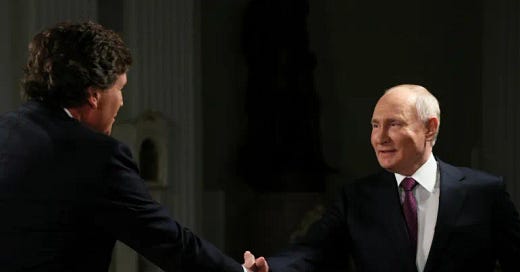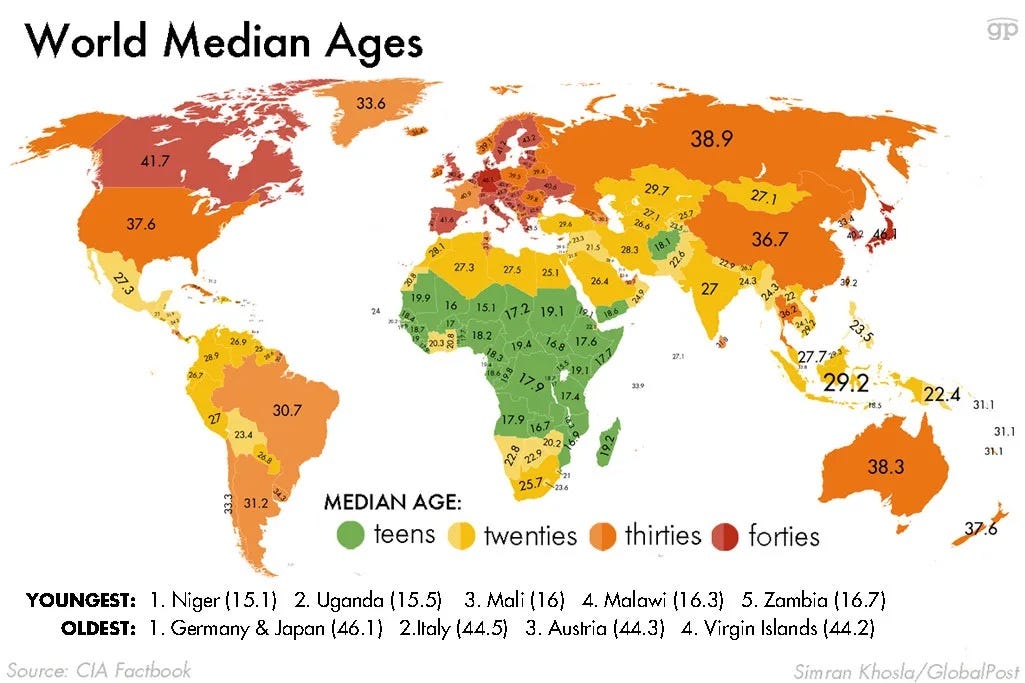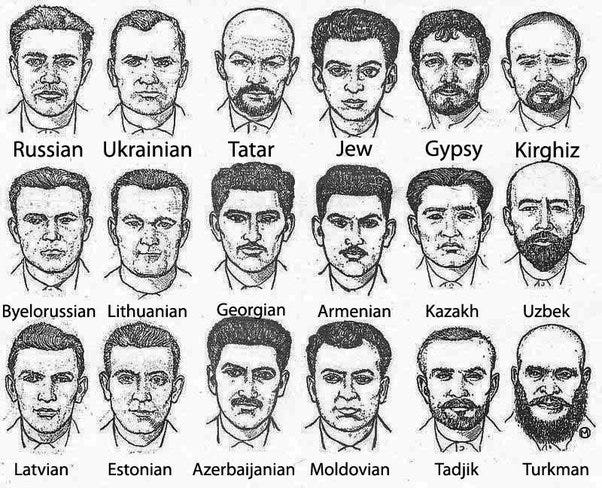Tucker, Putin, and Russian Ethnology
"The President of Ukraine himself, by the way, is a Jew by nationality."
I watched the two hours of Tucker Carlson’s interview with Vladimir Putin so that I could have an informed opinion on it.
There’s a lot of different ways of taking the Putin interview and regrettably I find myself having a rather unique take on what was said and what went unsaid. I tend only to write about subjects if I think no one else is touching them. Call me silly like that.
As careful readers know I made mention of the Russian ethnologist Lev Gumilev earlier in the week. How curious indeed that he should come up so soon thereafter! I’ve come to study these types of figures mentioned by our peer rival countries — I’ve talked quite a bit about the Chinese Tocqueville Wang Huning — but I suspect leaders use thinkers to signal to domestic and international constituents.
To some extent America is rather impoverished because we don’t really have thinkers who operate as Rasputins or advisers to the King. This very much makes our system somewhat inscrutable but it’s not the way in much of the rest of the world where leaders make mention, sometimes obliquely, sometimes explicitly about what’s on their reading list. How much the leader has actually read the books (or listened to the podcast) is an open question but it’s sort of immaterial anyway. The homage is made—and the book sales go up. So it is with Gumilev, who died in 1992, and Putin, who made use of his material in his interview with Tucker Carlson.
You can read a rather great review of Gumilev’s work in The Financial Times from 2016 about Gumilev’s theory of passionarnost, which Gumilev used to explain the lifeblood of nations.
Here’s The FT:
Freed in 1956 after two stints in Siberia, Gumilev went to work for the Institute of Geography at Leningrad University. His first publication was a trilogy on the history of the steppe nomads: The Xiongnu, about the nomads who terrorised Han dynasty China, and Ancient Turks and Searches for the Imaginary Kingdom, about the Mongols. But his epiphany about “passionarity” stayed with him. For decades, he never tired of telling people about his breakthrough, the biological impulse that drives men to irrational deeds.
His theories were at best unorthodox, and at worst quite eccentric. “Passionarity” in Gumilev’s work is a quantifiable measure of the mental and ideological energy at the disposal of a given nation at a given time. He believed one could actually calculate it with impressive equations and plot it on graphs. He even assigned it a symbol as a mathematical variable: Pik.
In 1970, Gumilev published an article in the journal Priroda (Nature), in which he laid out the idea of the “ethnos” — something similar to a nation or ethnic group — which he described as the most basic element of world history: the national or ethnic self-identification that is “a phenomenon so universal as to indicate its deep underlying foundation”. Drawing on his labour-camp theories, he argued that ethnoi were not social phenomena but rather the result of a biological instinct to acquire a “stereotype of behaviour” early in life. “There is not a single person on earth outside of an ethnos,” he was fond of saying. “Everybody will answer the question, ‘What are you?’ with ‘Russian, ‘French’, ‘Persian’, ‘Maasai’ etc, without a moment’s hesitation.”
In other words much of Gumilev’s thinking can be seen by applying prison camp rules. Which is an utterly interesting way of thinking about global affairs.
For what it’s worth I’ve come to think that the Eurasian project that Gumilev began and that Dugin and others continue is really about tapping into the relative youth of the Turkic countries at the expense of an aging Russia. “Tatars [ethnic Turks] are in our blood, our history, our language, our worldview. Whatever the real differences with the Russians, the Tatars are not a people outside us, but within us,” wrote Gumilev. Might this explain why Russia is so spooked by greater Turan projects?
To be sure, Gumilev might be a bit of a crank — you’d be a crank too if you were put into a Russian gulag repeatedly — but his ideas are quite salient in modern Russia and much of the Turkic world. There are statues to him across the Turkic world. He also was not shy about his influence: “I am a genius, but no more than that.”
Given Putin’s rather lengthy historical presentation to Tucker it’s easy to see Gumilev has had a rather large effect on Putin’s telling of the Russian cause. You can watch a discussion about Gumilev on Kazakh TV.
The way in which we view Russia is through Jewish eyes but that isn’t how Russia’s elite increasingly views itself. Putin himself seems to mention how Zelensky is a “Jew by nationality” — a very peculiar formulation.
Left unsaid is how Putin clearly sees Ukraine as a fake country — he has said it before — and a fake people with a Jewish leader. He sees them as a part of Khazaria.
How much does Putin agree with Gumilev’s views of Jews — a group Gumilev thought “sucks its sustenance out of the indigenous ethnos”? We don’t really know but we might hazard a guess given his purported closeness with Chabad that Putin isn’t exactly a Zionist. Maybe the Rebbe was right when he predicted that Netanyahu would be the last leader of Israel and hasten the coming of the Messiah.
We saw Russia through ideological frames afforded to us by the Cold War and to some extent this analysis persists because not all the Pentagon’s Russia analysts have retired. Before that, we saw Russia through the takes of refugees who didn’t like very much that the Czar was complicit in the pogroms. This is an error and it’s one which has been encouraged by what I’ve called The Atlantic school which sees David Frum and Anne Appelbaum as keen to goad America and its European allies into a conflict with Russia. Naturally there are a lot of defense contracts to mete out. To the extent that this group dominates our conversation it’s because its co-ethnics often pay the Georgetown restaurant tabs of this commentariat.
“One thing the Tucker interview makes pretty clear, which was plenty adversarial, is how much of our Russia discourse is actually about the clique of post-Soviet looters--the Summerses, Blavatniks, etc--wanting to dominate the conversation about it,” writes Arthur Bloom.
The flight of billionaires — many of them Turkic-born — to renounce their citizenship is not getting a lot of attention but it’s a sign. Pay careful attention to the moves of Uzbek oligarch (and Facebook investor) Alisher Usmanov who just recently lost a legal challenge on EU sanctions.
If you have this view of the steppe and these hordes of foreigners sweeping in and destabilizing your country or civilization maybe you start to think about how to use other peoples to destabilize your adversaries, or at the very least to put pressure on them.
Part of the problem on the Southern border of the United States or in dealing with the Russians generally is that Russia wants to visit their loss of borders on America.
If you take passion seriously, as Putin evidently does, you want to use these impassioned peoples to invade your adversaries. You’ll use people like human trafficker (and Greg Abbott mega donor) Matt Michelsen who has a longstanding relationship with Russian front Rebekah Mercer. More on that later. But until then read Arthur Bloom’s great piece, “Where to Look for Human Smuggling at the Southern Border.”
That the invaded people trigger similar almost auto-immune responses from the local population is so much the better as far as Putin is concerned. Nationalists do wild things.
After all, Putin has great respect for nationalists, and you know that from his discussion of Zelensky. Putin knows full well that behind a lot of the world’s nationalist groups are GRU or IDF handlers.
Tucker Carlson: Do you think Zelensky has the freedom to negotiate the settlement to this conflict?
Vladimir Putin: I don’t know the details, of course it’s difficult for me to judge, but I believe he has, in any case, he used to have. His father fought against the fascists, Nazis during World War II, I once talked to him about this. I said: “Volodya, what are you doing? Why are you supporting neo-Nazis in Ukraine today, while your father fought against fascism? He was a front-line soldier.” I will not tell you what he answered, this is a separate topic, and I think it’s incorrect for me to do so.
But as to the freedom of choice – why not? He came to power on the expectations of Ukrainian people that he would lead Ukraine to peace. He talked about this, it was thanks to this that he won the election overwhelmingly. But then, when he came to power, in my opinion, he realized two things: firstly, it is better not to clash with neo-Nazis and nationalists, because they are aggressive and very active, you can expect anything from them, and secondly, the US-led West supports them and will always support those who antagonize with Russia – it is beneficial and safe. So he took the relevant position, despite promising his people to end the war in Ukraine. He deceived his voters. [Emphasis mine].
There was also this rather telling moment when, unprompted, Putin brought up genetics, or genomics, in the context of a national security matter worth paying attention to. (This was also when Putin praised his asset, Elon Musk. Special Agent Johnathan Buma and I warned about this Russian-billionaire collusion, as you well know.)
“Mankind is currently facing many threats. Due to genetic researches, it is now possible to create a superhuman, a specialized human being – a genetically engineered athlete, scientist, military man,” he told Tucker. “It is impossible to stop research in genetics or AI today, just as it was impossible to stop the use of gunpowder back in the day. But as soon as we realize that the threat comes from unbridled and uncontrolled development of AI, or genetics, or any other fields, the time will come to reach an international agreement on how to regulate these things.”
Take it from me but over the years there have been efforts by the Russians to invest in genomics research in the United States. The famous example was when Usmanov went and bought James Watson’s Nobel prize — only to return it to him.
As America comes to dominate space — once a shared area of commonality with the Russians — might we expect to see the Russians embrace genomics as an area for shared collaboration? It’s possible, perhaps, but only after Putin goes. I think we’re safe from any genetically engineered supermen. Science tells us that there’s no Ubermensch possible (though it is interesting how both Nazism and Gulievism seem to have czarist underpinnings). I highly recommend The Russian Roots of Nazism: White Émigrés and the Making of National Socialism, 1917–1945 for those who dare to read such things.
You almost have to wonder if the rediscovery of Gumilev is really about how Russia can’t meet the European standards of behavior in the modern world. Russia becomes bestial only when Marxism is judge to have failed. Perhaps, though, Marx really was about extending Western dominance, as Gumilev would have. After all, didn’t Marx retire to England? What if all that pushing by Marx of a worldwide proleteriat was merely the Brits, vexed about a rising industrial Germany and sought to unionize it before it got out of hand?
Maybe the emergence of Gumilev thought is a tell that the British project of backing Bolshevism and Marxism in Europe achieved its goal — the total deindustrialization not just of Russia but of Europe. Neither Marx nor Gumilev could have imagined that a weakened Russian petrostate would be more dangerous than the world communism proffered by the USSR.
I suspect that the Russians don’t really have a vision for a world where Bidenomics is ascendant and where emissions are reduced while renewable electric grids power our future.
*****
Trump, for his part, makes it clear that if the Europeans don’t pay up, he’ll let the Russians have their way with them. I think this is unlikely — if the Russians are faring poorly against Ukraine do you really think they’ll beat Poland, armed as it is to the teeth? — but it’s not my continent to worry about. I suspect the Europeans will get much better at espionage and buy a few things here and there from America. Plus ça change, plus c’est la même chose.
Do you think the Europeans are going to stand by idly while that happens? Or do you think they’ll do all they can to see to it that Trump is not reelected? Pay close attention to the Danes. Something is very right there.
There’s the larger question about who is really backing Tucker Carlson and what’s the real purpose of this Putin interview but that’s a topic for another time.
Until then, brush up on Gumilev whose influence continues. You can read about it the next issue of the New York Review of Books.
[Gumilev] eventually enjoyed support at high levels of the Communist Party, the General Staff of the Armed Forces, and the Ministry of Foreign Affairs. In 1995 the State Duma awarded one of his books on Russian history a prestigious prize. Approved by the Ministry of Education of the Russian Federation as a high school textbook, it was reissued in a print run of 100,000. Gumilev’s celebration of Central Asian peoples also made him a hero of Kazakhstan’s former autocratic president Nursultan Nazarbaev. In the Kazakh capital, Astana, students attend Gumilev Eurasian National University. On the hundredth anniversary of Gumilev’s birth, Nazarbaev named a mountain for him (Gumilev Peak). In Russia, Gumilev’s ideas penetrate everywhere, and his central terms—“passionarity,” “complementary,” “chimaera,” and others—have entered common usage.
Gumilev arrived at his core idea in the Gulag, where, without paper, he somehow (the story goes) contrived to write a book on the paper used to wrap food supplies. His theories represent a fantastic excursion into pseudoscience, which thrives in Russia even among serious scholars and scientists. In Gumilev’s view, an ethnic group, which he calls an “ethnos” (“ethnoi” in the plural), is not a social but a biological phenomenon, analogous to a herd or flock among animals. Developing according to biochemical laws, an ethnos constitutes “a biophysical reality…. Ethnic belonging, which manifests itself in the human consciousness, is not a product of…consciousness.”
This is nutty stuff, to be sure, but it’s important to take it seriously given its wide purchase in Russian society. We cannot afford a Russia which furthers race science or encourages the kind of balkanization or “race war” that white nationalists — often backed by Russians or Israelis — find so appealing. It’s not an accident that Vladimir Putin, KGB agent, often made common cause with white nationalists like Rainer Sonntag whilst working in East Germany.
There are quite a number of invented polities — the Turks since Erdogan come to mind — but to the extent that civilizations prosper it isn’t by encouraging people to think of themselves in ethnic terms but in a larger imperial context.
The failure of Putin’s Russia to imagine that world, despite its rich history, and to create the kind of politics others might aspire to, means its days are number.
You might think of the future as a battle between Sir Francis Galton’s Enlightenment stewardship and Lev Gumilev’s perpetual prison-style ethnic conflict but that is a post for another time. It might even be the stuff we’re all really fighting over.





